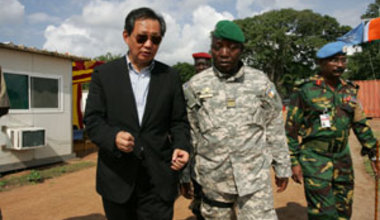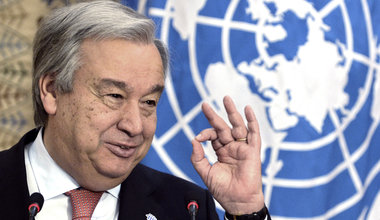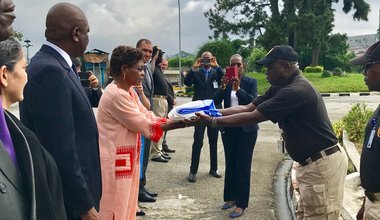THE 1000 MICRO-PROJECTS INITIATIVE AIMS TO HELP CREATE A STABLE CLIMATE, THE HEAD OF UNOCI SAYS IN SEGUELA

Séguéla 15 August 2008....The « 1000 Micro projects » initiative launched in Bouaké by the Special Representative of the UN Secretary-General for Côte d'Ivoire, Y.J. Choi, seeks to help create a stable climate and "give a real fillip to the electoral process and to the programme for ending the crisis in Côte d'Ivoire", Mr Choi stated on Friday.
The Special Representative was speaking in the town of Séguéla, 528 km northwest of Abidjan, at a meeting held to provide information to officials of UN agencies in the field so as to optimize their involvement in the initiative. He said the meeting with the agencies was also aimed at making sure everyone was equally informed and thus understood that the initiative offered enormous prospects for an excellent resolution of the crisis.
The visit to Séguéla was part of a sensitization caravan on the "1000 Micro projects" initiative, which targets the socio-economic reinsertion of ex-combatants and young people at risk in Côte d'Ivoire. The initiative, financed by the United Nations, falls within the framework of support for the national programme for the reinsertion and reintegration of ex-combatants and former militia members, set up by the Ivorian Government and supported by its international partners.
While in Séguéla, the Special Representative also met local administrative authorities, traditional chiefs, representatives of the Forces Nouvelles (FN) and ex-combatants to explain the initiative. He said the "1000 Micro projects" were important both to the UN mission and to the ex-combatants and stressed the urgent need to propose feasible and fundable projects so as to benefit from the available financing, which amounts to CFA 300,000 to 420,000 per ex-combatant.
« If the first cycle is crowned with success, we shall issue certificates to the best people so that they can have access to additional assistance to pursue their activities," he explained. He also appealed for effective sensitization on the ground to guarantee the success of the micro projects that are approved in the Séguéla region.
The Prefect of Séguéla, Ibrahima Fofana, congratulated and thanked UNOCI for the initiative and for its efforts, which succeeded in breaking the distrust of donors, who then contributed to it. He promised that he and his collaborators, conscious of the fact that it was urgent and indispensable for the elections to be held in a peaceful climate, would do everything to carry out sensitization in synergy with everyone involved in the process. An individual who is idle and without resources is a danger for those around him, the Prefect said, adding: "If activities are not found for the ex-combatants, they could be a danger for the process. I am appealing to everyone to help prevent that because the micro-projects will generate income for these people who have none."
His words were corroborated by the FN's Deputy Zone Commander for Séguéla, Coulibaly Djiman, who confirmed that the fate of their ex-combatants was a source of concern for the FN. "We are in contact with those who have been demobilized and we hope now that with these 1,000 micro-projects, we'll know what to do with them," he said, stating that the FN are committed to peace and elections and want only one thing – a definitive solution for their former combatants so that everything goes well.
Earlier, the head of UNOCI's Disarmament, Demobilisation and Reintegration (DDR) Section, Sidi Ould Zahabi, gave a presentation on the "1000 Micro projects" initiative and how to benefit from it. He explained that the Ivorian authorities, whose representatives are on the caravan, support the efforts of UNOCI and the international community, along with the National Programme for Reinsertion and Community Rehabilitation (PNRRC). Mr Zahabi added that it was through the efforts of the Special Representative that four million dollars had been obtained from the UN Peace building Fund to finance the 1000 micro projects. He added that this first phase was a test and, if successful, could lead to an extension of the initiative and serve as an example for other UN peacekeeping missions.
The question-and-answer that followed provided an opportunity to address the concerns of participants in the meeting, show them how to mount projects and explain to them whom to approach for the various procedures.
 ONU
ONU Nations Unies Maintien de la paix
Nations Unies Maintien de la paix





